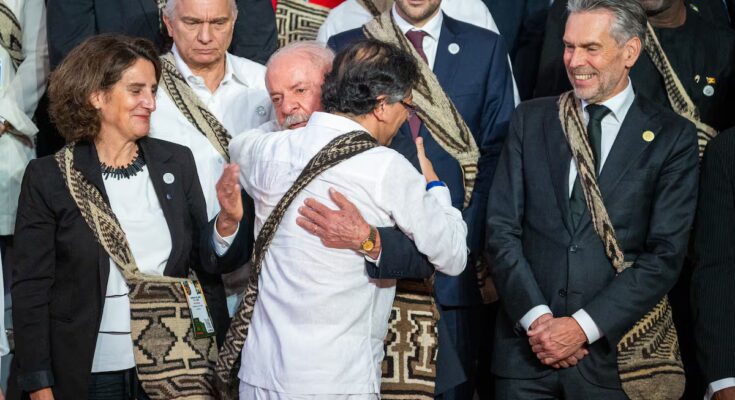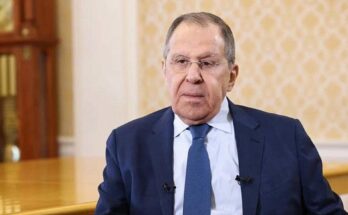A few hundred kilometers from Santa Marta, on the Colombian Caribbean coast, there is a new theater of war. The United States is fighting there what it considers to be a battle against drug trafficking which has already caused 70 deaths and 18 boats destroyed by missile strikes. Donald Trump assures that they were loaded with illegal drugs destined for the US market. He has already warned that the attacks will not stop. The issue entered the agenda of the fourth summit between the Community of Latin American and Caribbean States (CELAC) and the European Union (EU), held this Sunday in the coastal city.
Colombian Gustavo Petro, host of the summit, made it clear in his opening speech that the meeting will not only talk about intercontinental cooperation, green energy and sustainable digital development. “The same missiles that fall in Gaza fall here, in the Caribbean, on poor people,” he said. Petro assures that one of those killed in the American operations was a fisherman from Santa Marta. “In light of international treaties, in light of democracy and freedom in the world, he was simply murdered. It was an extrajudicial execution,” he said, later calling for the bilateral meeting to serve as “a beacon of light in a world where barbarism is advancing.”
If the European delegation hoped to circumvent the problem, it could not. Questioned upon arrival at the Estelar Santamar convention center, the high representative of Foreign Affairs, Kaja Kallas, said that “according to international law, force can only be used for two reasons: in self-defense or following a resolution of the United Nations Security Council.”
The Brazilian Luiz Inácio Lula da Silva had already stated that the Santa Marta summit would have no reason to exist “if the issue of American warships in the seas of Latin America was not discussed”. The president of the largest American economy delayed confirming his presence until the last minute, busy receiving participants at the COP30 climate summit in Belém. Finally, he traveled with the intention of raising the issue of alleged drug traffickers. “The threat of the use of military force has once again become part of daily life in Latin America and the Caribbean. Old rhetorical maneuvers are recycled to justify illegal operations,” Lula said in his presentation. “We are a region of peace and we want to remain at peace. Democracies do not fight crime by violating international law. Democracy also succumbs when crime corrupts institutions”
A Brazilian government source stressed that “with his trip to Santa Marta, Lula sent a message: to demonstrate that there is a situation in the South American Caribbean and that we are not interested in any military solution on the northern coast of South America and much less in the countries bordering Brazil, such as Colombia and Venezuela.” “We do not recognize the elections in Venezuela and we do not in any way support what is happening in Venezuela, but we are much less interested in a military problem on our northern border with the Amazon,” he says.
Lula left Santa Marta as soon as he finished his presentation. The same goes for the president of the Spanish government, Pedro Sánchez, who had a hectic arrival because the city’s airport was not prepared to receive a plane of the size he is traveling on.
By mid-morning the text of the final declaration had already been agreed at ambassador level. Only the technical details were missing. In the European delegation there was enthusiasm for the tone and content of the final text, in a summit that had opened weighed down by important absences. The document will contain a section referring to the war in Ukraine and Gaza, the military tension in the Caribbean due to the American advance and a chapter dedicated to migration, a particularly delicate bilateral issue. As on previous occasions, countries that disagree on a specific point can express their disagreement in writing.
Only a dozen heads of state traveled to Colombia, out of a total of 60. One of the most significant victims was that of the president of the European Commission, Ursula von der Leyen, despite the fact that she was in Belém on Friday at the closing of COP30. Among the heads of state, the Uruguayan Yamandú Orsi withdrew at the last minute due to logistical problems. Right-wing and far-right Latin American governments have worked to hollow out the summit. Argentina, under the administration of Javier Milei, sent the interim undersecretary for Foreign Affairs; Paraguay to the Deputy Minister of Foreign Affairs and the Salvadoran Government Nayib Bukele to the Director of Foreign Policy, third level official of the Ministry of Foreign Affairs. Ecuador didn’t even send a representative.
On the eve of the summit, President Petro had already stated that the United States had attempted to boycott the event by applying pressure, especially on Caribbean countries. But on Sunday the atmosphere was different. The president of the Council of Europe and co-host, António Costa, had anticipated that he expected a good result. “Approving a joint declaration is proof that multilateral dialogue is very important. Despite having 60 countries here, with very different ideological orientations, we managed to have a common position on the most critical issues of the moment,” he said. Santa Marta was a successful bet on multilateralism.



